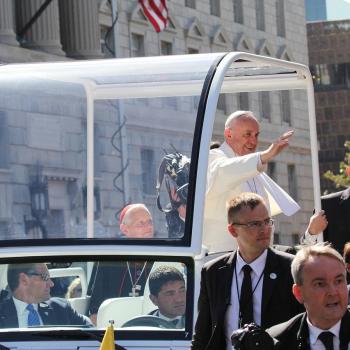Garrett: I know that you met with your Board this morning, and know this question must be on all your minds. How can the Library be an intellectual and societal resource in the face of such rapid change? More broadly speaking, how can libraries and institutions built traditionally around books and collections continue to be relevant and useful in a world that grows ever more digital?
Francis: We still need places to think. And I think the ambiance of the Library is very conducive to thought, to study, to writing, to reflecting. That's probably what we primarily market now-—he books are a resource to check references, to browse. Wandering along the shelves, seeing what's next to the book you were interested in—it can be a terrible diversion, but it's also part of a wider knowledge that somehow feeds into the larger project. That's harder online. You don't get the serendipity of something that seems totally unrelated.
Garrett: When we start to talk about what great men or women from the past would think about this or do about that, we always of course have to be careful of our own prejudices, but if Gladstone were alive today and looking at the political scene, at the Church, what are some of the things you suppose would engage his interest?
Francis: Both as a politician and as a person of faith he'd be very concerned about the divisions between Islam and Christianity and the political repercussions of that, and I think he would do everything he could to counter the disinformation and misinformation between those great faith communities.
I think he would be concerned—I'm not particularly concerned about this, but I think he would be—about moral laxity, and the lack of seriousness. I think politically, he would be horrified by the lack of knowledge of his fellow politicians. One of the things you really sense with Gladstone is that enormous depth of knowledge, the enormous intellectual hinterland he has. He wouldn't give out nicely glib answers—he wouldn't go down well with our sort of tabloid culture, it would be a long, considered sentence. I think he would have to have changed a bit! But on the whole, our politicians are not very knowledgeable, even about the subjects they're supposed to be ministers of. I think that's something he would be fairly horrified by: the standard of debate, the standard of oratory, and the lack of knowledge.
Garrett:In what ways can Gladstone's Library be a resource for progressive Christianity, or help progressive Christians understand their faith better?
Francis: Well, I think we come back to the term "liberal" again in talking about the Library. The Christianity it professes is liberal and open, so that's respecting people's differences, respecting other understandings of faith. The only sort of rule it has is no proselytism, no bidding for souls, because if that started to happen all hell would break loose! And of course, as with other things liberal, it works if you have other liberal-minded people around, and probably excludes those people who don't have that wide conception of God's mercy or God's truth. My favorite hymn is "There's a wideness in God's mercy like the wideness of the sea" and that's a very appropriate one for this place.





